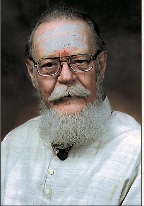By Devananda Tandavan
Has there been anyone among us that has not injured himself, to only experience a complete and lasting healing by “mommy kissing the booboo and making it well?” This is a very common expression of the placebo effect. Placebo comes from Latin and means “I shall please.” Over the years, the phrase has taken on less admirable meanings and suggestion of evil attributes. Today, however, it merely names a substance that is known not to contain pharmacologically active ingredients. In other words, it is a substance, usually a sugar such as lactose, that can have no active effect on the sickness.
Studies show placebos “heal” various illnesses. It is even said a placebo will heal at least 50% of all ailments. One feels better after a placebo, and many symptoms are abated. What is the power of this inert substance? The following are essential for placebo therapy: The patient must seek treatment for his condition. The doctor must show a great deal of attention in taking a history, doing a physical examination, perhaps adjunct laboratory and radiological tests. Then he must make a diagnosis, which is positive and unequivocal and revealed to the patient in a positive manner. If he sees that a placebo may successfully be given for the condition, he must be prepared to give it rather than a potent drug or antibiotic. In our day and age of “managed medicine” this art is rapidly being lost, so that medicine is no longer the beautiful amalgam of science and art. This is to the detriment of our health.
There is a correlation between suggestion and the placebo effect. Patients sensitive to suggestion do best with placebos. Experiments with both positive and negative suggestions affirm suggestion is a potent force. It may at times reverse an illness, or even cause one. I suggest a theory as to how the placebo effect operates. In our subconscious mind is a naive, childlike consciousness. This “child’s” natural desire is to be in a healthy body. If there is enough stress, anxiety or depression in life, the child will react, causing symptoms to appear in the body. One can communicate with and impress this child that a cure will be successful, and instill positive expectation. Then the placebo will work and the subconscious child will bring about his goal of a healthy body. Through natural suggestibility, this self is able to accept the suggestion without “thinking” about it, and thus alter the body as needed.
Affirmations, repetition, prayers, chanting and ritual are all ways to convince the “child.” All of this can also be attributed to a placebo, as the doctor has assured it is going to be successful, and instills great expectancy in the patient. There is basis in fact for the “red” or “green” medicines, muddy and bitter tasting concoctions, tablets (large and hard to swallow), and even capsules of various colors–all effective placebos. Each has an effect on the subconscious self differently, according to background and experience of the subject.
Some believe using a placebo is dishonest. But if the placebo effect works, why use a harsher active ingredient? All active ingredients should only be prescribed when there is a valid need. Also, a percentage of the effect of medicines with active ingredients may also be a placebo. This is really nature’s first gateway to healing.
Dr. Tandavan, 78, retired nuclear physician and hospital staff president, lives in Chicago, where he specializes in alternative healing arts. If you are interested in further articles on health and healing visit his home page. [http://www.himalayanacademy.com/books/drt/]
